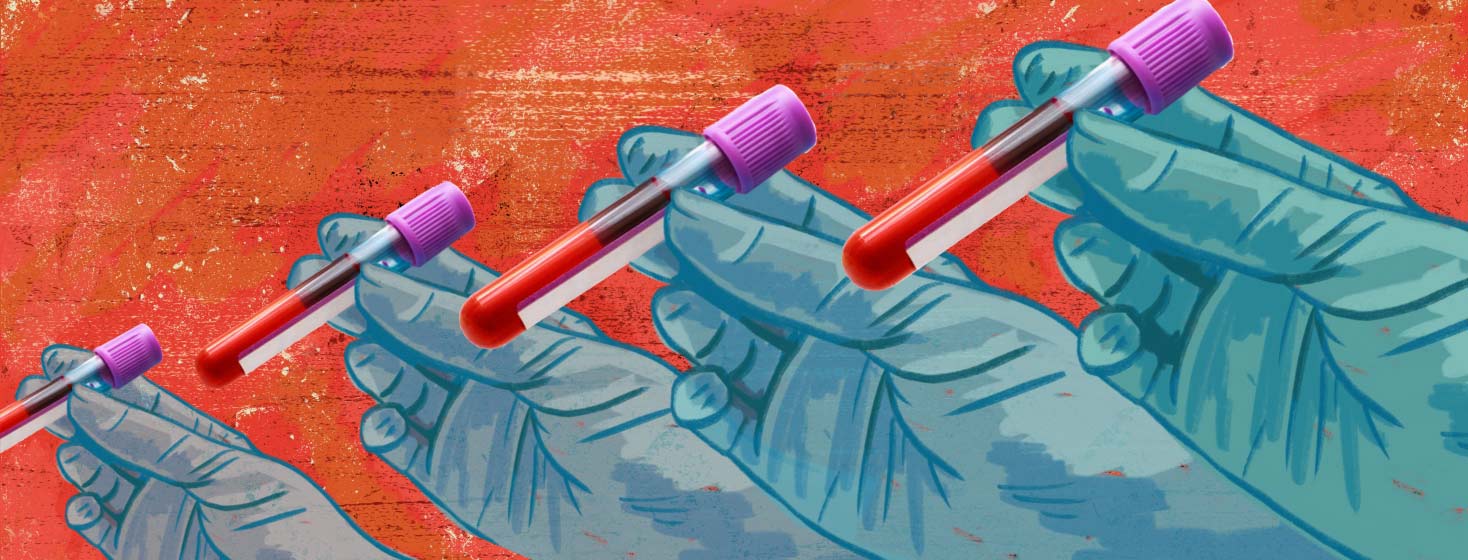Getting Tested: How Often Should I Test for STIs and HIV?
Getting tested regularly for HIV and other sexually transmitted diseases (STDs) can help you stay healthy. But how often to get tested can vary from person to person.
What is an STD?
STDs are infections that can be spread from person to person through sexual contact. STDs are also called sexually transmitted infections (STIs). Some doctors use the term "infection" because a person may have no symptoms of disease. Some STDs also can be spread from mother to baby during childbirth and through sharing needles.1,2
The most common STIs include:1,2
- Chlamydia
- Gonorrhea
- Genital warts / human papillomavirus (HPV)
- Hepatitis B
- Herpes
- HIV/AIDS
- Syphilis
- Trichomonas
Why should I get STD testing?
STDs are very common. The number of syphilis, chlamydia, and gonorrhea infections is climbing. According to the Centers for Disease Control and Prevention (CDC), 1 in 5 Americans has a sexually transmitted infection. STIs often cause no symptoms, so getting tested may be the only way to know if you have an STD, including HIV.1,3-5
Without treatment, STDs can lead to serious health problems. Having another STI also increases your risk of transmitting or contracting HIV.1-4
Discussing sexual health with your doctor can be uncomfortable. But many providers do not discuss STD screening with their patients, so it is important for you to bring it up. Understanding your risk can help you make informed decisions about testing.4,6
Who is at risk for an STI?
If you have vaginal, anal, or oral sex, you could be exposed to STDs. According to the CDC, STIs can sometimes even spread through other intimate physical contact.1
The communities most commonly affected by STIs include:4
- People age 15 to 24
- Gay, bisexual, and other men who have sex with men (MSM)
- Pregnant people
- People from certain racial and ethnic groups
Some behaviors put people at higher risk of being exposed to an STD. Factors that can increase your risk of getting HIV and other STIs include:3
- Having sex without using condoms
- Having multiple sex partners
- Having sex with unknown partners
- Having sex with someone who has an STD, including HIV
- Having a prior STI
- Engaging in sex while under the influence of drugs or alcohol
- Injecting drugs with needles
- Exchanging sex for drugs or money
Chlamydia
Chlamydia is the most common STI. In 2021, there were over 1.6 million new cases in the United States. Over half of these cases occurred in people aged 15 to 24. Rates of chlamydia are higher in women than men.7
Syphilis
Syphilis infection is most common in the following groups:8
- Men who have sex with men
- People with HIV or other STIs
- People who use illicit drugs
- People with a history of incarceration, sex work, or military service
HIV
HIV transmission is most common among men who have sex with men (MSM). Over 65 percent of new HIV cases are from male-to-male sexual contact, and 12 percent of MSM have HIV.3,9
Featured Forum
View all responsesSTI testing recommendations
Experts recommend testing for STIs, including HIV, in people between the ages of 15 and 65. Frequency and type of testing are based on your risk factors.9-11
People who have been treated for chlamydia or gonorrhea are at risk of a repeat infection. Follow-up testing is recommended 3 months after treatment.6
Women
Sexually active women under the age of 25 should be screened for:10
- Chlamydia
- Gonorrhea
- HIV
The CDC recommends at least yearly STI screening for people with HIV. Women with HIV should be screened yearly for the following:10
- Chlamydia
- Gonorrhea
- Syphilis
- Trichomonas
- Hepatitis B and C (if recommended by your doctor)
MSM
Sexually active gay, bisexual, and other MSM are advised to get screened yearly for:10
- Chlamydia
- Gonorrhea
- Syphilis
- HIV
- Hepatitis B and C (if recommended by your doctor)
MSM with additional risk factors, such as those who use drugs or have multiple partners, should be screened every 3 to 6 months.6,9
MSM with HIV have higher rates of other STDs. Testing should include:10
- Chlamydia
- Gonorrhea
- Syphilis
- Hepatitis B and C (discuss screening intervals with your doctor)
For more details on STI testing for pregnant women, men who have sex with women, and transgender and gender-diverse people, check the CDC's Screening Recommendations.10
Health disparities in STIs and HIV
STIs and HIV can affect anyone. But certain groups of people are at higher risk of contracting them. Some people's access to STD screening and treatment also may be limited by social factors.6,7,12
- Chlamydia and gonorrhea – Black people have 5 to 8 times the rate of chlamydia and gonorrhea than white people. The infection rate among Hispanic/Latino people is twice the rate of white people.
- Syphilis – People who are Black, American Indian, Alaska Native, Hispanic, and Native Hawaiian or other Pacific Islander have higher rates of syphilis.
- HIV – About 40 percent of new HIV cases in the United States occur in the Black community. And Black people with HIV are less likely than people of other racial groups to receive optimal medical care.
STDs, including HIV, are more common among people who get their healthcare at the following locations:9
- STD clinics
- Tuberculosis clinics
- Correctional facilities
- Homeless shelters
HIV and STI prevention
To protect yourself and your partner(s) from STIs, including HIV:2
- Use a condom every time you have vaginal, anal, or oral sex.
- Reduce your number of sexual partners.
- Ask your doctor about vaccination against hepatitis B and HPV.
If you are at increased risk of HIV infection, talk to your doctor about PrEP. PrEP stands for pre-exposure prophylaxis. PrEP is medicine that can lower your chances of getting HIV when taken every day.2

Join the conversation